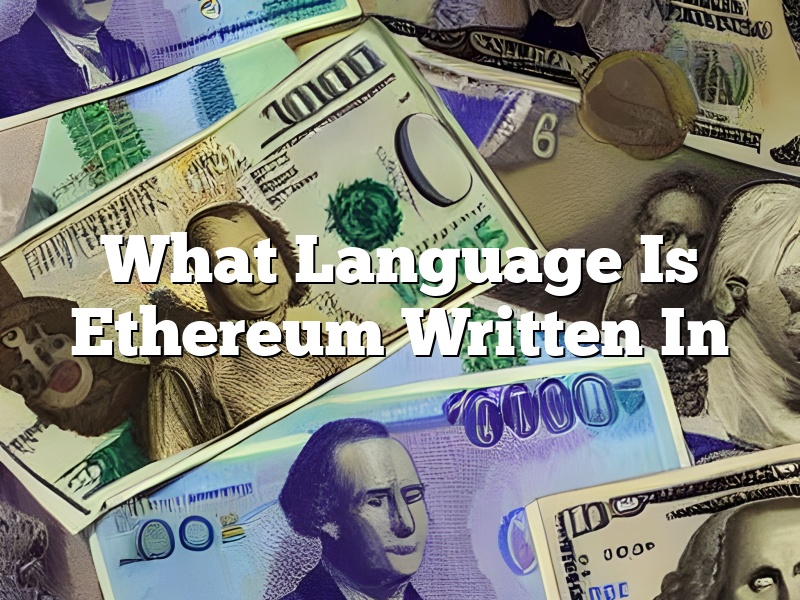What Language Is Ethereum Written In
Ethereum is a blockchain-based platform that allows for the creation of decentralized applications. It is written in the programming language Solidity.
Solidity is a contract-oriented, high-level programming language for writing smart contracts. It was designed to target the Ethereum Virtual Machine (EVM). Solidity is statically typed, meaning that all variables must be declared before they are used. It also has a number of features that make it suitable for creating secure smart contracts, such as automatic memory management and modularity.
The Ethereum Foundation, the organization that develops Ethereum, recommends that new developers start with Solidity. It has become the most popular language for writing contracts on the Ethereum platform, and there is a large community of developers who are working on building tools and libraries for it.
Contents
What language is Ethereum coded in?
What language is Ethereum coded in? Ethereum is coded in Solidity. Solidity is a contract-oriented, high-level language for writing smart contracts. It was designed to target the Ethereum Virtual Machine (EVM).
Is Ethereum written in C++?
Ethereum is a decentralized platform that runs smart contracts: applications that run exactly as programmed without any possibility of fraud or third party interference.
Ethereum is written in Solidity, a contract-oriented programming language for writing smart contracts.
Is Solidity similar to C++?
Solidity is a contract-oriented programming language for writing and deploying smart contracts on the Ethereum blockchain. It is similar to C++ in its syntax and structure, making it a good choice for experienced developers who are already familiar with C++.
One of the biggest advantages of Solidity is that it allows developers to create contracts that are more secure and less likely to be hacked. This is because Solidity is specifically designed for the Ethereum blockchain, which is known for its security and robustness. In addition, Solidity offers a number of features that are not available in other programming languages, such as the ability to create contracts that can be automatically verified for errors.
Overall, Solidity is an excellent choice for developers who are looking for a contract-oriented programming language that is similar to C++. It offers a number of features that make it a secure and reliable choice for writing and deploying smart contracts on the Ethereum blockchain.
What is Ethereum written?
What is Ethereum?
Ethereum is a decentralized platform that runs smart contracts: applications that run exactly as programmed without any possibility of fraud or third party interference.
Ethereum is unique in that there are a finite number of them: 21 million.
What is a smart contract?
Smart contracts are a new way of using the blockchain technology that underlies Bitcoin. They are contracts that are automatically executed when certain conditions are met.
What can Ethereum be used for?
Ethereum can be used to create decentralized applications that run on the blockchain. It can also be used to create tokens that can be used to represent assets or participate in voting or governance mechanisms.
Is Solidity hard to learn?
Solidity is a programming language for writing smart contracts on the Ethereum blockchain. It is a contract-oriented, high-level language whose syntax is similar to that of JavaScript.
Is Solidity hard to learn?
That depends on your level of programming experience. If you are familiar with JavaScript, you should be able to pick up the basics of Solidity fairly quickly. However, Solidity is a more complex language than JavaScript, and it takes time to learn all its features.
What are the benefits of learning Solidity?
Solidity is one of the most popular programming languages for writing smart contracts. As such, learning Solidity will give you access to a huge potential market for your skills. Additionally, Solidity is a well-designed language that is likely to remain popular for many years to come.
Should I learn Solidity or Python?
Solidity or Python? This is a question that many people are asking themselves lately. Both languages have a lot to offer, but which one is the right choice for you?
Solidity is a programming language that was specifically designed for writing smart contracts on the Ethereum blockchain. It is strongly influenced by JavaScript, and many developers find it relatively easy to learn. Solidity is currently the most popular language for writing smart contracts.
Python is a general-purpose programming language that is widely used in many industries. It is a versatile language that can be used for a variety of purposes, including developing smart contracts. Python is also relatively easy to learn, and many developers consider it to be a more user-friendly language than Solidity.
So, which language should you learn? It really depends on your needs and preferences. If you want to develop smart contracts on the Ethereum blockchain, then Solidity is the best choice. If you want to develop smart contracts in a more general sense, or if you are not sure which blockchain you want to use, then Python is a good option.
Is Bitcoin built on C++?
Bitcoin is a digital asset and a payment system invented by Satoshi Nakamoto. Transactions are verified by network nodes through cryptography and recorded in a public dispersed ledger called a blockchain. Bitcoin is unique in that there are a finite number of them: 21 million.
C++ is a powerful object-oriented programming language that enables developers to create software that is both efficient and reliable. It is one of the most commonly used programming languages in the world and is often used to create software for financial institutions and other large businesses.
So, is Bitcoin built on C++? The answer is yes. Bitcoin is written in C++ and makes use of many of the features that make C++ such a popular language for software development. This makes Bitcoin both efficient and reliable, which is why it has become such a popular digital asset.






0